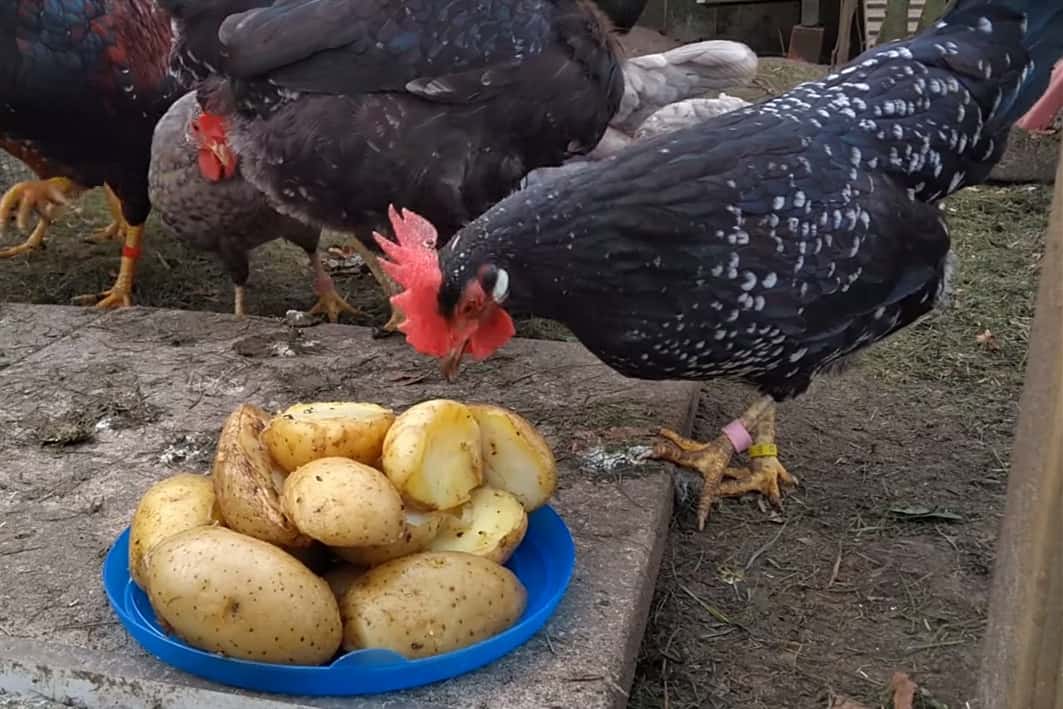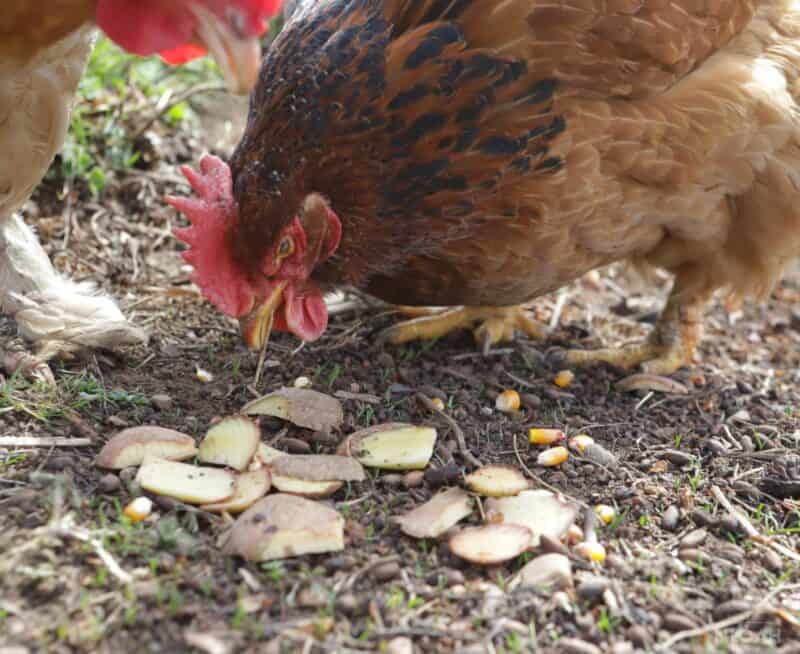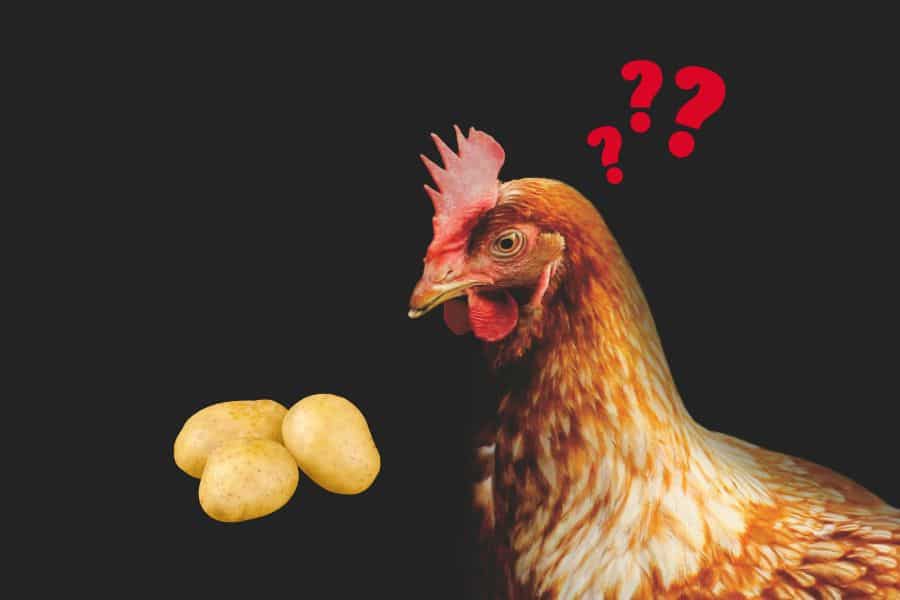Can Chickens Eat Potatoes
Chickens should not eat potatoes because they are toxic to them. Potatoes are toxic to chickens and should not be included in their diet.
While potatoes may be a staple for humans, they can be harmful to chickens due to the presence of solanine, a toxic substance. When consumed, solanine can cause digestive issues, respiratory problems, and even death in chickens. It is essential for chicken owners to be aware of the potential dangers of feeding potatoes to their flock.
Instead, chickens should be provided with a balanced and nutritious diet that includes chicken feed, grains, fruits, vegetables, and occasional treats like mealworms or leafy greens to ensure their optimal health and well-being.

Credit: www.youtube.com
Nutritional Needs Of Chickens
Chickens can eat potatoes as part of their diet, as long as they are cooked and cut into small pieces. However, it’s important to remember that potatoes should only be given as a treat and not as a main source of nutrition for chickens.
|
As chickens have specific nutritional requirements, it’s important to understand their dietary needs to ensure their well-being. Let’s explore the different aspects of their nutritional needs, including protein requirements, carbohydrate intake, and the role of minerals and vitamins.
Protein Requirements:
Chickens need protein not only for the development of feathers and muscles but also for the growth and maintenance of internal organs. A diet rich in protein enables chickens to thrive and live a healthy life. It is important to note that their protein needs can vary depending on factors such as age, breed, and activity level. Ensuring a balanced and varied diet that includes protein sources like soybeans, fishmeal, and insects can help meet their requirements.
Carbohydrate Requirements:
While chickens primarily rely on grains and seeds for their carbohydrate intake, they can also benefit from incorporating cooked and mashed potatoes into their diet. Potatoes serve as an additional source of energy, but it is crucial to cook them thoroughly to enhance digestibility. Raw potatoes are not recommended as they can pose a risk of digestive issues for chickens.
Role Of Minerals And Vitamins:
Aside from protein and carbohydrates, chickens require a proper balance of minerals and vitamins for their overall health and well-being. These nutrients play a vital role in various bodily functions, including maintaining strong bones, supporting the immune system, and promoting proper growth. A well-rounded diet that includes a variety of fruits, vegetables, and commercial feed can help provide the necessary minerals and vitamins that chickens need.

Credit: www.poultryfarmguide.com
Feeding Chickens Potatoes
Potatoes are a staple in many households, but can they also be included in your chickens’ diet? Let’s explore whether chickens can eat potatoes and any potential risks and concerns associated with feeding them this starchy vegetable.
Can Chickens Eat Potatoes?
Yes, chickens can eat potatoes. In fact, potatoes can be a nutritious addition to their diet when fed in moderation.
Raw potatoes should be avoided as they contain solanine, a toxic substance that can be harmful to chickens. However, cooking potatoes eliminates solanine, making them safe for consumption.
Potential Risks And Concerns
While potatoes can be a suitable food source for chickens, there are a few risks and concerns to consider:
- Glycoalkaloid Poisoning: Green potatoes or those with sprouts contain higher levels of glycoalkaloids, which can be toxic to chickens. Always remove any green parts or sprouts from potatoes before feeding them to your flock.
- High Starch Content: Potatoes are high in starch, which can lead to weight gain and obesity in chickens. It is important to offer potatoes as a treat in moderation and as part of a balanced diet.
- Unbalanced Nutritional Profile: Potatoes should not replace a varied diet that includes essential nutrients from other sources. While rich in carbohydrates, potatoes lack certain vitamins, minerals, and proteins that are necessary for chickens’ overall health.
Overall, feeding chickens potatoes can be an enjoyable treat for them, but it is essential to do so in moderation and without compromising their balanced diet.
Benefits Of Feeding Chickens Potatoes
When it comes to raising chickens, it’s important to provide them with a balanced and nutritious diet. While grains and seeds are typically the mainstay of a chicken’s diet, introducing other food items can offer various benefits. Potatoes, often associated with human consumption, can actually be a healthy addition to a chicken’s menu. In this article, we will explore the benefits of feeding chickens potatoes.
Source Of Energy
Potatoes serve as an excellent source of energy for chickens. They are high in carbohydrates, which are essential for providing the fuel needed for daily activities and maintaining body temperature. The starches in potatoes are easily digested by chickens, making it an efficient energy source. By including potatoes in their diet, you are ensuring that your chickens have the energy they need to thrive.
Variety In Diet
Just like humans, chickens can benefit from a diverse diet. Introducing potatoes into their feeding routine offers a new flavor and texture, adding excitement to their meals. Eating the same food every day can become monotonous for chickens, so providing them with a variety of foods, including potatoes, keeps their taste buds satisfied and prevents boredom.
Supplementing Nutritional Intake
Potatoes contain several essential nutrients that can supplement a chicken’s daily nutritional intake. They are rich in vitamin C, B vitamins, and minerals such as potassium and manganese. Incorporating potatoes into their diet helps ensure that your chickens receive a well-rounded selection of nutrients necessary for their overall health and wellbeing.
Now that you are aware of the benefits that come with feeding chickens potatoes, you can consider adding them to their feeding routine. Remember to introduce potatoes gradually and in moderation, as excessive consumption can cause digestive issues. Consult with a poultry nutritionist to determine the appropriate amount to include based on the specific needs of your flock.
Preparation And Feeding Methods
When it comes to keeping chickens, it’s essential to provide them with a well-rounded and balanced diet. While chickens are omnivores and can eat a variety of foods, it’s important to understand the right preparation and feeding methods for each type of food. In this article, we will focus on potatoes and how to safely incorporate them into your chicken’s diet. Potatoes are a common staple in many households, but can chickens eat potatoes? Let’s find out!
Cooking Potatoes For Chickens
To make potatoes safe and digestible for chickens, it’s important to cook them properly. Raw potatoes contain solanine, a naturally occurring toxic substance that can be harmful to chickens and other animals. So, always ensure that you cook the potatoes before feeding them to your feathered friends. Here are a few simple methods to cook potatoes for chickens:
- Boiling: Boiling potatoes is a popular method that helps break down the starch and make them easily digestible for chickens. Simply peel and chop the potatoes into small pieces, then boil them until they become soft and tender.
- Mashing: Mashed potatoes are another great option for your chickens. Boil the potatoes, then use a potato masher or fork to mash them. Make sure there are no added seasonings or ingredients that could be harmful to the chickens.
- Baking: If you prefer baking potatoes, you can do so by wrapping them in aluminum foil and baking them in the oven until they are fully cooked. Once cooled, you can then mash or chop them into smaller pieces to feed your chickens.
Remember, it’s important to let the cooked potatoes cool down before feeding them to your chickens. This ensures that they are not too hot, which can be harmful to their delicate digestive system. Also, avoid adding any additives such as butter, salt, or other seasonings that may not be suitable for chicken consumption.
Feeding Potatoes In Moderation
While cooked potatoes are safe for chickens, it’s crucial to understand that they should be fed in moderation. Potatoes should not replace the main dietary components of a chicken’s diet, such as grains, vegetables, and protein sources. Instead, consider potatoes as a healthy and occasional treat for your chickens. Here are some important points to keep in mind:
- Quantity: Offer potatoes only as a small portion of your chicken’s meal. Too much potato consumption can lead to an imbalance in their diet or cause digestive issues.
- Frequency: Limit potato treats to once or twice a week. This ensures that your chickens still receive a balanced and nutritious diet without relying excessively on potatoes.
- Diversity: Ensure that potatoes are just one part of a varied diet for your chickens. Introduce other healthy fruits, vegetables, and grains to provide them with essential nutrients.
Feeding potatoes to chickens can be a fun and occasional addition to their diet. However, it’s important to remember that moderation is the key. By properly cooking potatoes and incorporating them into a balanced diet, you can offer your chickens a tasty treat without compromising their health and well-being.
Alternatives To Potatoes
Chickens can safely consume alternatives to potatoes, such as sweet potatoes, carrots, and leafy greens, as part of a balanced diet. Properly prepared veggies provide essential vitamins and nutrients for their well-being.
Potatoes are a common treat for chickens, but what if you’re looking for alternative options to diversify their diet? Fortunately, there are plenty of other vegetables and fruits that can be beneficial for your feathered friends. Let’s explore some of the best options to provide your chickens with a variety of nutrients and flavors.Other Vegetables For Chickens
When it comes to feeding your chickens, there are numerous vegetables that can offer a wholesome and nutritious alternative to potatoes. These vegetables not only provide essential vitamins and minerals but also add a burst of taste to their diet. Consider adding the following vegetables to their menu:- Carrots: Rich in vitamin A, carrots are a crunchy and flavorful addition to your chicken’s diet.
- Broccoli: Packed with vitamins and minerals, broccoli helps boost the immune system of your chickens.
- Cabbage: This leafy green vegetable is not only nutritious but also serves as a natural dewormer for your chickens.
- Squash: Whether it’s butternut, acorn, or zucchini squash, chickens love the taste and benefit from the vitamins and fiber it offers.
- Spinach: High in iron, spinach promotes healthy blood circulation for your chickens.
Fruits Suitable For Chickens
In addition to vegetables, fruits are a great way to provide your chickens with natural sugars and additional vitamins. These juicy treats are a delight for chickens and can be easily incorporated into their diet. Here are some fruits that your feathered friends will love:- Watermelon: A refreshing and hydrating fruit that chickens enjoy, especially during hot summer months.
- Blueberries: These tiny fruits are packed with antioxidants and can help improve your chickens’ overall health.
- Apples: Slice up some apples for your chickens to enjoy the vitamins and fiber this fruit provides.
- Pears: A sweet and juicy fruit that adds variety to their diet while offering essential nutrients.
- Bananas: Rich in potassium, bananas are a great option to provide your chickens with an energy boost.

Credit: www.newlifeonahomestead.com
Frequently Asked Questions Of Can Chickens Eat Potatoes
Can Chickens Eat Raw Potatoes?
Yes, chickens can eat raw potatoes, but it is not recommended. Raw potatoes contain solanine, a toxic compound that can harm chickens. It is better to cook or boil potatoes before feeding them to chickens to eliminate the risk of poisoning.
Are Potato Peels Safe For Chickens To Eat?
Yes, chickens can eat potato peels in moderation. Potato peels are safe for chickens as long as they are cooked or boiled. However, it is important not to feed them in large quantities as it may cause digestive issues. Ensure to cut the peels into small pieces to avoid choking hazards.
Can Chickens Eat Potato Leaves And Stems?
No, it is not recommended to feed chickens potato leaves and stems. They contain a higher concentration of solanine compared to the tubers. Solanine can be toxic to chickens and may lead to health problems. It is best to avoid feeding any parts of the potato plant to chickens.
Conclusion
To conclude, chickens can indeed eat potatoes, but moderation is key. While potatoes can provide some nutritional benefits and serve as a tasty treat for our feathered friends, it is essential to cook them thoroughly to remove any harmful toxins.
Remember to always introduce new foods gradually and observe your chickens’ reactions. By following these guidelines, you can ensure a happy and healthy diet for your chickens.
{ “@context”: “https://schema.org”, “@type”: “FAQPage”, “mainEntity”: [ { “@type”: “Question”, “name”: “Can chickens eat raw potatoes?”, “acceptedAnswer”: { “@type”: “Answer”, “text”: “Yes, chickens can eat raw potatoes, but it is not recommended. Raw potatoes contain solanine, a toxic compound that can harm chickens. It is better to cook or boil potatoes before feeding them to chickens to eliminate the risk of poisoning.” } } , { “@type”: “Question”, “name”: “Are potato peels safe for chickens to eat?”, “acceptedAnswer”: { “@type”: “Answer”, “text”: “Yes, chickens can eat potato peels in moderation. Potato peels are safe for chickens as long as they are cooked or boiled. However, it is important not to feed them in large quantities as it may cause digestive issues. Ensure to cut the peels into small pieces to avoid choking hazards.” } } , { “@type”: “Question”, “name”: “Can chickens eat potato leaves and stems?”, “acceptedAnswer”: { “@type”: “Answer”, “text”: “No, it is not recommended to feed chickens potato leaves and stems. They contain a higher concentration of solanine compared to the tubers. Solanine can be toxic to chickens and may lead to health problems. It is best to avoid feeding any parts of the potato plant to chickens.” } } ] }




